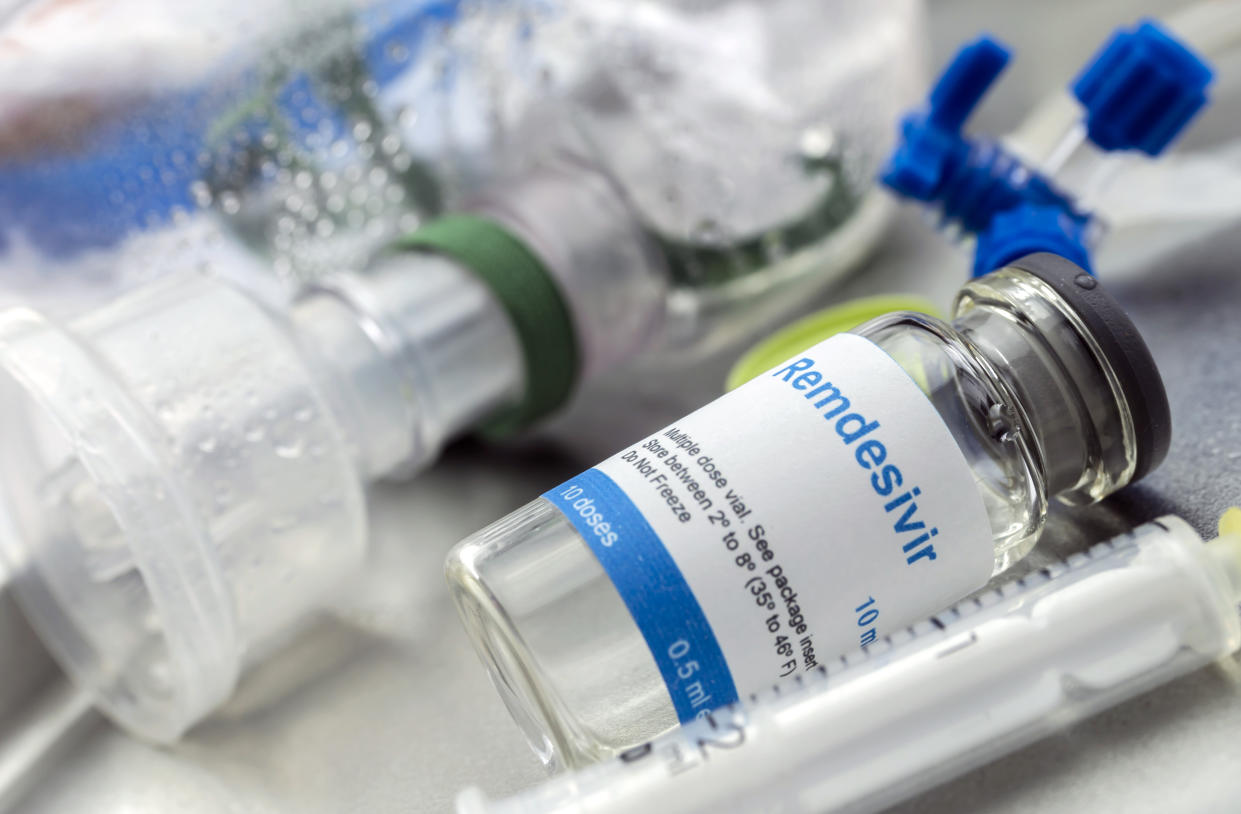Remdesivir not a 'magic bullet' but could help speed up recovery, experts say

The Food and Drug Administration officially greenlit the use of remdesivir as a treatment for hospitalized COVID-19 patients this week, making it the first drug approved to treat the coronavirus. “The FDA is committed to expediting the development and availability of COVID-19 treatments during this unprecedented public health emergency,” said FDA Commissioner Dr. Stephen M. Hahn in a statement.
Hahn added that the decision is “supported by data from multiple clinical trials that the agency has rigorously assessed,” calling it “an important scientific milestone in the COVID-19 pandemic.” Remdesivir, which was initially developed as a potential treatment for hepatitis C, has shown mixed results in COVID-19 studies, but scientists seem to agree that it has some benefits — and that FDA backing is a good thing.
“The FDA approval may help lower some of the regulatory barriers to get the drug to people who may benefit from it,” says Dr. James Cutrell, an associate professor of medicine at the University of Texas Southwestern’s Division of Infectious Disease. “But we still need to continue to do clinical studies to better identify who that patient population is.”
As experts continue to study the drug, here’s what you need to know.
Remdesivir was initially created to treat hepatitis C and was tested as a treatment for Ebola
Sold under the brand name Veklury, remdesivir is an anti-viral initially created by U.S. drugmaker Gilead in 2009 as a potential treatment for hepatitis C. It failed to produce results there, so it was later tested as a treatment for Ebola during the 2014 outbreak in West Africa. Although it proved safe in clinical trials, it did not have a major impact on Ebola and was largely abandoned as a treatment method. Gilead began issuing the drug to hospitals in late January 2020 as a way to combat COVID-19 under the FDA’s expanded access rule (sometimes known as “compassionate use”) and by early summer had gathered data showing it may have some benefit.
The drug works by blocking the replication of SARS-CoV-2
Cutrell says that it’s unclear exactly why remdesivir proved ineffective for Ebola, but with COVID-19, the drug seems to be able to stop an important process in the infection. “As the virus is trying to copy or replicate its genetic material, the drug interferes with that and blocks that process,” Cutrell says. It’s for this reason that it may prove crucial to administer the drug — which is given through IV — early on.
“From a mechanism standpoint, we think that it is going to work best in people given early in the disease, which is when the viral loads are the highest and the virus is copying itself,” says Cutrell. “If given later in the disease, when patients are more in the immune and inflammatory phase of the illness, it may not work as well at that point.”
Multiple studies have shown the drug may speed up recovery
In its document approving the use of remdesivir, the FDA details three randomized clinical trials in which remdesivir has been used to treat COVID-19, with varying degrees of success. In one study, from late February, patients who were given remdesivir showed a five-day reduction in hospital stay compared with those who weren’t. The other two randomized trials listed by the FDA found that remdesivir had similar benefits either through a five-day course or a 10-day course.
But it seems unlikely that it has an effect on mortality
While there have been positive signs that it helps expedite recovery, a recent study from the World Health Organization suggested that the drug does not lower the mortality rates in those extremely ill with COVID-19. Cutrell says these studies leave more room for research. “Just because the drug is FDA approved doesn’t mean that we shouldn’t continue to do studies to best understand how to use the drug or which patients benefit the most,” says Cutrell. “We still have to remain clear-eyed about what the drug has been proven to do and what it hasn’t.”
He hopes that those interpreting the approval won’t consider remdesivir to be a perfect solution to this virus. “It’s been shown to speed up the recovery in patients, but it hasn’t shown to reduce deaths,” he says. “People need to keep in mind it’s not a home run or a magic bullet. We need other therapies, including ones that can be given earlier and can be given to people who are outpatient and don’t have to be in the hospital to receive an IV.”
For the latest coronavirus news and updates, follow along at https://news.yahoo.com/coronavirus. According to experts, people over 60 and those who are immunocompromised continue to be the most at risk. If you have questions, please reference the CDC’s and WHO’s resource guides.
How to maintain your physical and mental health during the pandemic
Taking care of a loved one with COVID-19? Here’s how to stay healthy
Q&A with Dr. Kavita Patel: How to keep your family safe and maintain your mental health
Read more from Yahoo Life
Want lifestyle and wellness news delivered to your inbox? Sign up here for Yahoo Life’s newsletter.



